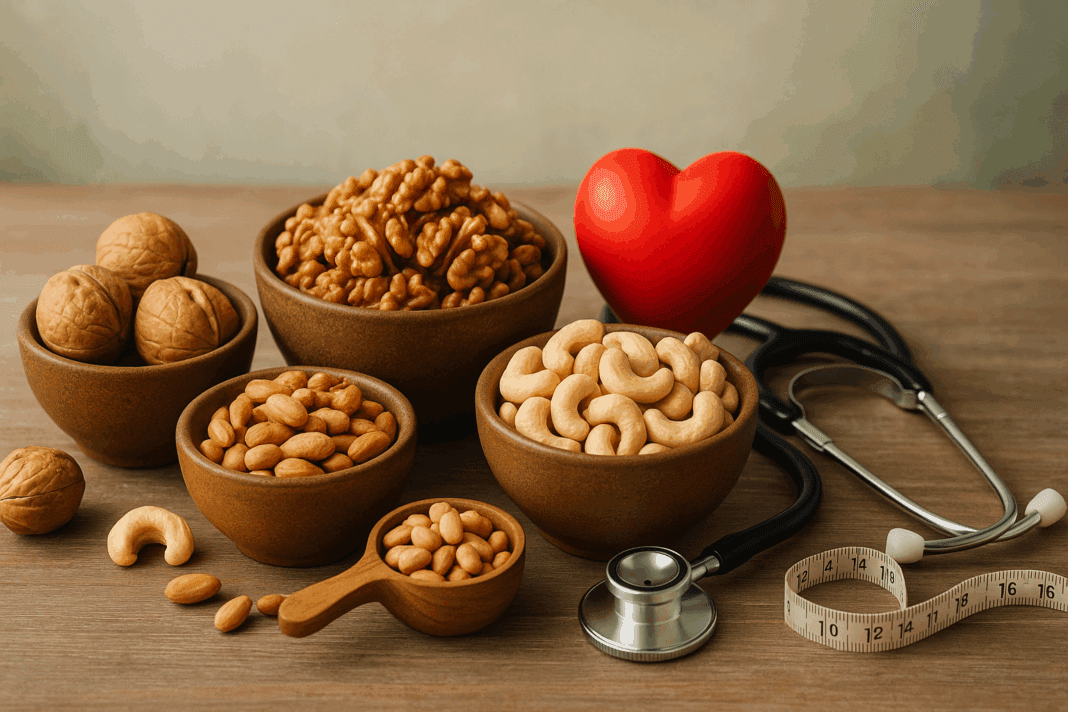The growing awareness of heart health has led to an increased interest in dietary strategies that can naturally reduce high cholesterol levels. Among the many functional foods that have earned a place in the spotlight, nuts have repeatedly demonstrated impressive cardiovascular benefits. Whether you are managing high cholesterol or simply interested in optimizing your long-term health, understanding the role of nuts in lowering blood lipids can offer valuable insights. In this article, we explore what science says about the best nuts for high cholesterol, with a specific focus on walnuts, cashews, and peanuts—three popular varieties that are both accessible and nutrient-rich. Through a deep dive into clinical studies and expert dietary guidelines, we answer questions like: Do walnuts help control cholesterol? Are peanuts high in cholesterol? And can cashews help lower your cholesterol? The goal is to empower you with evidence-based knowledge so you can make heart-smart choices for a healthier future.
You may also like: 4 Ways to Have a Healthy Diet: Expert Tips Backed by Science for Better Nutrition and Long-Term Wellness
Understanding the Link Between Cholesterol and Heart Health
To grasp why nuts may influence cholesterol, it is essential to understand what cholesterol is and how it affects cardiovascular health. Cholesterol is a waxy, fat-like substance that is vital for the production of hormones, vitamin D, and cell membranes. However, when levels of low-density lipoprotein (LDL) cholesterol become elevated, they contribute to plaque buildup in arteries, a condition known as atherosclerosis. This process can increase the risk of heart attacks, strokes, and other forms of cardiovascular disease. On the other hand, high-density lipoprotein (HDL) cholesterol acts as a scavenger, transporting excess cholesterol back to the liver for excretion.
Elevated total cholesterol or an unfavorable LDL-to-HDL ratio is a red flag for many individuals seeking preventive health strategies. Lifestyle modifications such as diet, exercise, and weight management are considered first-line interventions before turning to pharmacological treatments. This is where dietary elements like nuts become relevant. Rich in unsaturated fats, fiber, plant sterols, and antioxidants, nuts offer a multi-faceted approach to improving lipid profiles.
Why Are Nuts So Good to Lower Cholesterol?
The cholesterol-lowering potential of nuts lies in their unique nutrient composition. Most nuts are naturally high in monounsaturated and polyunsaturated fats, which can help reduce LDL cholesterol when they replace saturated fats in the diet. Furthermore, nuts contain plant sterols, compounds structurally similar to cholesterol that compete for absorption in the digestive tract, effectively lowering the amount of cholesterol that enters the bloodstream.
Another beneficial component found in nuts is soluble fiber, which binds with bile acids in the intestine and helps eliminate them from the body. Since bile acids are made from cholesterol, this process reduces circulating cholesterol levels. Additionally, many nuts contain antioxidants such as vitamin E and polyphenols, which reduce oxidative stress and inflammation, further supporting heart health.
Given these attributes, it becomes clear why nuts are good for cholesterol. They offer a comprehensive set of nutrients that work synergistically to improve blood lipid profiles. When included as part of a balanced diet, nuts can be a powerful ally in the quest to get rid of cholesterol naturally.
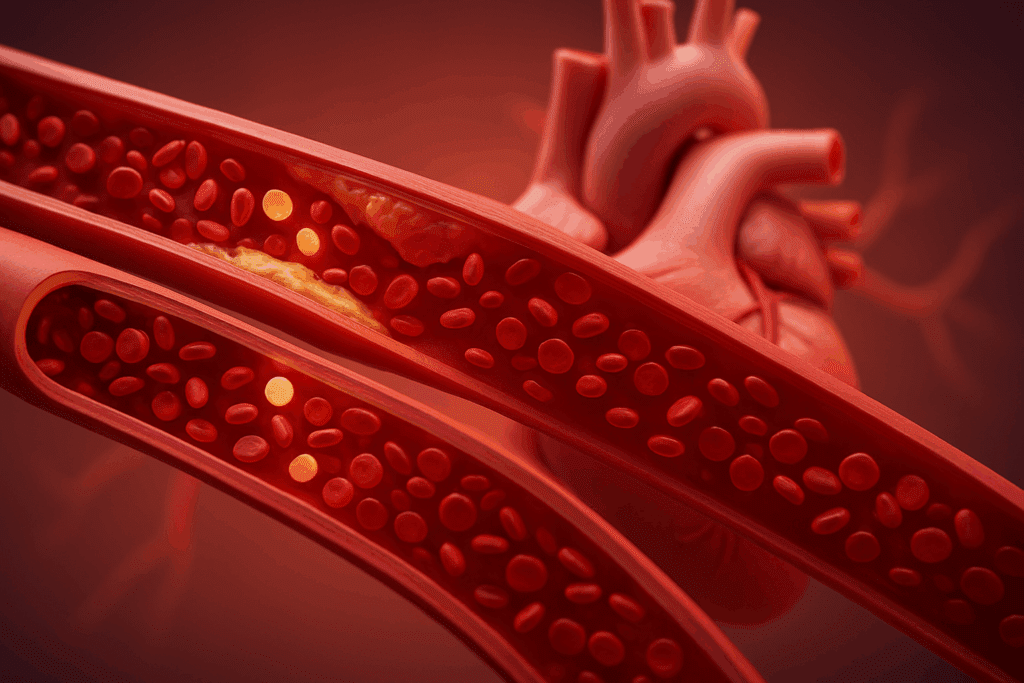
Are Nuts High in Cholesterol? Debunking a Common Myth
One of the most persistent misconceptions about nuts is that they are high in cholesterol. This confusion may arise from the fact that nuts are rich in fats and calories, leading some to assume they also contain dietary cholesterol. In reality, all plant-based foods, including nuts, are completely free of cholesterol. The only sources of dietary cholesterol are animal-derived products such as meat, eggs, and dairy.
So, do nuts have cholesterol? The unequivocal answer is no. Despite being calorie-dense, nuts do not contain any cholesterol themselves and, when consumed in moderation, can actually help lower cholesterol levels in the body. This makes them an ideal snack or meal addition for individuals concerned about cardiovascular health.
The emphasis should be placed not on total fat content but on the type of fat present. Unsaturated fats found in nuts have been shown to lower LDL cholesterol while maintaining or even increasing HDL cholesterol, contributing to a healthier lipid profile. Therefore, understanding the fat composition and health effects of nuts helps clarify why they are not only safe but beneficial for those managing high cholesterol.
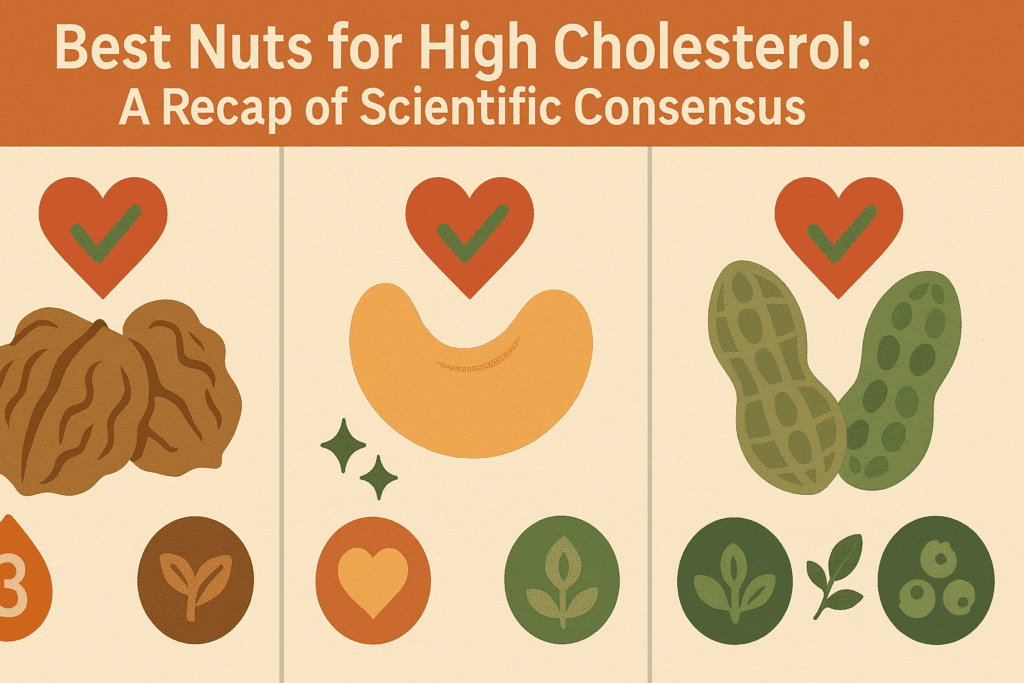
What Nuts Are Best to Get Rid of Cholesterol?
When it comes to choosing the best nuts to lower cholesterol, not all varieties are created equal. While most nuts offer some cardiovascular benefits, certain types have been more extensively studied for their lipid-lowering effects. Among these, walnuts, cashews, and peanuts frequently emerge as top contenders.
Walnuts are particularly notable for their high content of alpha-linolenic acid (ALA), a plant-based omega-3 fatty acid. This compound has been linked to reduced inflammation and improved endothelial function, both of which contribute to better cardiovascular outcomes. Cashews, although lower in fiber than some other nuts, are rich in monounsaturated fats and magnesium, which can support heart health and blood pressure regulation. Peanuts, technically legumes but nutritionally similar to tree nuts, contain a blend of healthy fats, protein, and resveratrol, a compound known for its antioxidant properties.
Scientific studies consistently support the inclusion of these nuts in a cholesterol-lowering diet. For example, a randomized controlled trial published in the “American Journal of Clinical Nutrition” found that daily walnut consumption significantly reduced LDL cholesterol in hypercholesterolemic adults. Other studies have shown similar benefits with cashew and peanut consumption, making them viable options for those looking to manage their cholesterol levels effectively.
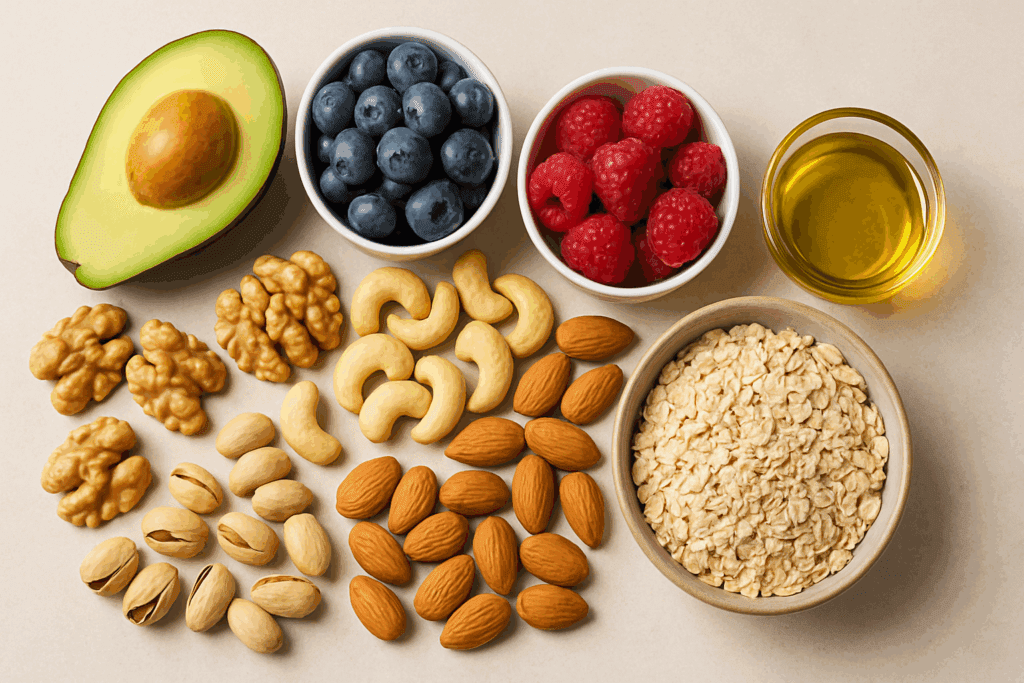
Do Walnuts Help Control Cholesterol?
Walnuts have perhaps the most robust body of research backing their role in cholesterol management. Numerous studies have demonstrated that regular walnut consumption is associated with lower levels of total cholesterol and LDL cholesterol. This is largely attributed to their high content of polyunsaturated fats, including omega-3 fatty acids, as well as bioactive compounds like polyphenols.
The anti-inflammatory properties of walnuts also play a role in their cardiovascular benefits. Chronic inflammation is a known contributor to atherosclerosis and other heart conditions, and reducing systemic inflammation can improve overall heart function. Furthermore, the fiber in walnuts adds to their lipid-lowering effects by aiding in the excretion of bile acids.
A 2019 meta-analysis published in the journal “Nutrients” concluded that walnut-enriched diets significantly reduce LDL cholesterol and improve overall lipid profiles. This evidence reinforces the recommendation of walnuts as a dietary strategy for managing hypercholesterolemia. So, do walnut help control cholesterol? The scientific consensus is a resounding yes.
Are Walnuts OK for High Triglycerides?
In addition to their benefits for LDL and total cholesterol, walnuts have shown promise in reducing triglyceride levels. Triglycerides are another type of lipid in the blood that, when elevated, increase the risk of cardiovascular disease. While dietary changes alone may not always be sufficient to manage high triglycerides, incorporating walnuts can be an effective part of a broader lifestyle intervention.
Studies suggest that diets rich in omega-3 fatty acids, such as those found in walnuts, can lead to significant reductions in triglycerides. The presence of ALA is particularly beneficial in this context. Moreover, the combination of fiber, antioxidants, and plant sterols in walnuts further supports their triglyceride-lowering capabilities.
Therefore, for individuals wondering whether walnuts are OK for high triglycerides, the answer is affirmative. When included as part of a balanced, calorie-conscious diet, walnuts can contribute meaningfully to lowering triglyceride levels and enhancing overall lipid profiles.
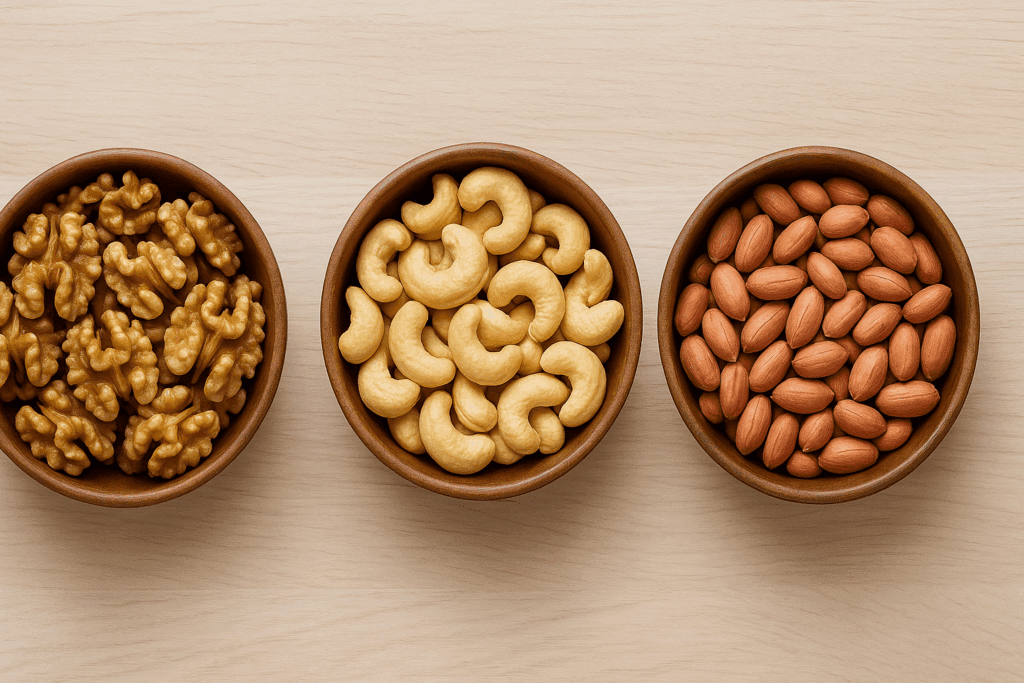
Do Cashews Help Lower Your Cholesterol?
Cashews are often overlooked in the discussion about heart health, perhaps due to their creamy texture and higher carbohydrate content compared to other nuts. However, emerging research suggests that cashews can play a positive role in cholesterol management. Rich in monounsaturated fats, cashews can help replace saturated fats in the diet, which is a key strategy for reducing LDL cholesterol.
In a 2018 study published in the journal “Nutrients,” researchers found that adults with elevated LDL cholesterol who consumed cashews daily experienced a significant reduction in total and LDL cholesterol compared to those who consumed a control diet. These findings are consistent with the hypothesis that cashews help lower your cholesterol by improving the quality of dietary fat intake.
Cashews also contain compounds like phytosterols and antioxidants, which contribute to their heart-healthy profile. While they may not be as fiber-rich as almonds or pistachios, cashews still offer substantial benefits when incorporated into a diverse and balanced diet. As a result, for those asking whether cashews help lower your cholesterol, the available evidence indicates that they do.
Does Peanut Increase Cholesterol? Or Do Peanuts Raise Cholesterol?
Peanuts have often been at the center of debate when it comes to heart health. As a legume rather than a tree nut, their nutrient composition differs slightly from that of walnuts or almonds. However, peanuts are rich in monounsaturated and polyunsaturated fats, similar to other nuts known for their heart-health benefits. They also provide resveratrol, an antioxidant associated with cardiovascular protection.
Numerous studies have investigated whether peanuts raise cholesterol or increase cardiovascular risk. The consensus from these studies is that peanuts do not increase cholesterol when consumed in moderation and as part of a balanced diet. In fact, they can help improve lipid profiles, particularly when they replace saturated fats or processed snacks.
A study published in “The Journal of Nutrition” demonstrated that participants who consumed peanuts regularly had lower total cholesterol and LDL cholesterol compared to a control group. These findings align with the broader evidence base suggesting that peanuts are good for cholesterol and should not be feared as contributors to high cholesterol.
Nuts to Lower Cholesterol: How to Incorporate Them Effectively
Adding nuts to your diet for cholesterol management involves more than simply snacking on them throughout the day. Portion control, preparation methods, and dietary context all play crucial roles in maximizing their benefits. Most experts recommend consuming a small handful (approximately one ounce or 28 grams) of nuts per day to achieve heart-health benefits without overconsumption of calories.
Opt for unsalted and raw or dry-roasted varieties to avoid excessive sodium and unhealthy added fats. Incorporating nuts into meals—such as adding chopped walnuts to oatmeal, blending cashews into sauces, or sprinkling peanuts over salads—can help integrate them seamlessly into your routine. Combining nuts with other cholesterol-lowering foods like oats, legumes, fruits, and vegetables can amplify their effects.
It is also essential to consider the overall dietary pattern. Nuts are most effective when they are part of a Mediterranean-style or plant-based diet, which emphasizes whole grains, lean proteins, healthy fats, and a wide variety of produce. In this context, nuts not only help lower cholesterol but also contribute to satiety, weight management, and metabolic health.
Best Nuts for High Cholesterol: A Recap of Scientific Consensus
As the evidence suggests, the best nuts to lower cholesterol include walnuts, cashews, and peanuts. Each of these nuts brings a unique profile of heart-healthy nutrients, from omega-3 fatty acids in walnuts to monounsaturated fats in cashews and resveratrol in peanuts. Collectively, they contribute to improved lipid levels, reduced inflammation, and better cardiovascular outcomes.
It is important to remember that the benefits of nuts are most pronounced when they are part of a broader, heart-healthy lifestyle. Exercise, stress management, smoking cessation, and balanced nutrition all work together to support long-term heart health. Nonetheless, including these specific nuts in your daily routine can be a simple and enjoyable way to support your cardiovascular goals.
So, what nuts are best to get rid of cholesterol? Based on current scientific understanding, the answer includes a mix of walnuts, cashews, and peanuts, all of which have demonstrated efficacy in improving cholesterol profiles without raising cholesterol levels themselves. They are not high in cholesterol, and they do not raise cholesterol when consumed responsibly.
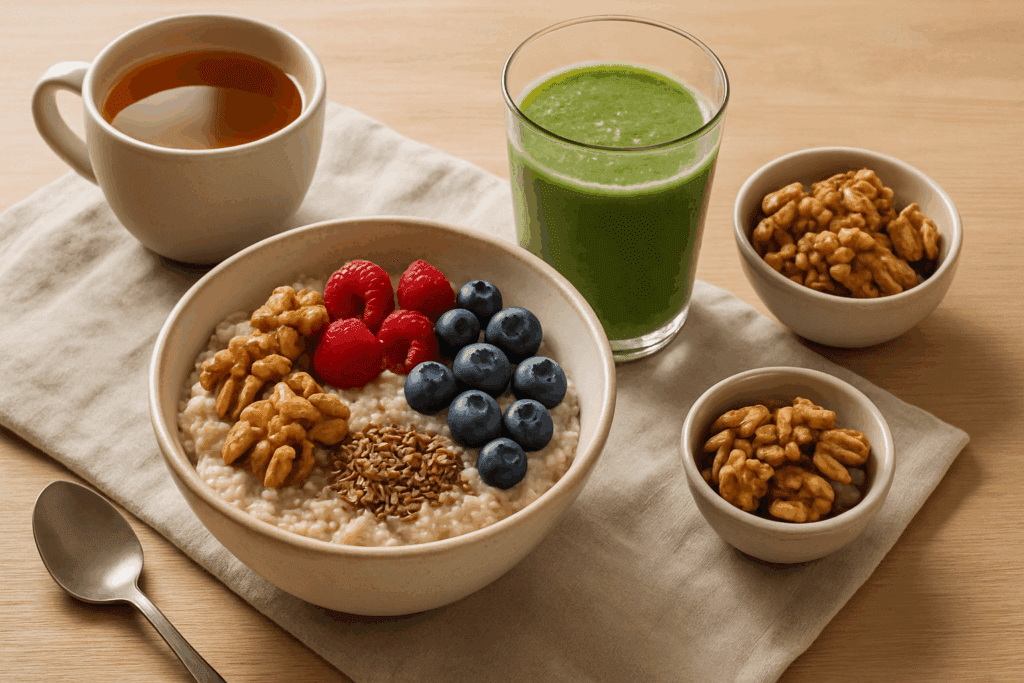
Frequently Asked Questions (FAQ): Best Nuts for High Cholesterol
1. How do different roasting methods impact the effectiveness of nuts to lower cholesterol?
Roasting nuts, especially at high temperatures, can alter their nutritional composition and potentially reduce their cholesterol-lowering benefits. While dry roasting preserves most heart-healthy fats, deep-frying nuts may increase unhealthy saturated fats, undermining their role as nuts good for cholesterol. Choosing raw or dry-roasted varieties helps maintain the integrity of monounsaturated and polyunsaturated fats that support healthy lipid profiles. Additionally, over-roasting may degrade antioxidants, such as vitamin E, which are critical to why nuts are so good to lower cholesterol. Therefore, if you’re selecting the best nuts to lower cholesterol, opt for minimally processed forms to retain their full cardioprotective potential.
2. Are walnuts ok for high triglycerides when combined with other dietary interventions?
Yes, walnuts are not only ok for high triglycerides, but they become even more effective when paired with a comprehensive dietary strategy. Including them in a Mediterranean-style diet or alongside omega-3-rich foods like flaxseeds and fatty fish amplifies their triglyceride-lowering effects. The synergy between these foods promotes better regulation of lipids beyond LDL, reinforcing why walnuts are among the best nuts for cholesterol management. It’s worth noting that individuals with elevated triglycerides often benefit from reducing refined carbohydrate intake while increasing fiber and healthy fats—a nutritional profile where walnuts excel. So, when paired wisely, walnuts can be an invaluable ally in achieving balanced triglyceride levels.
3. Do cashews help lower your cholesterol when consumed as cashew butter or in vegan sauces?
Cashew-based products like nut butters and dairy-free sauces can retain many of the same benefits as whole cashews when minimally processed. When unsweetened and free from hydrogenated oils, these alternatives can serve as a flavorful way to harness how cashews help lower your cholesterol. Cashew butter, in particular, offers a creamy, plant-based option for those avoiding animal fats, further supporting a heart-friendly diet. Incorporating it into meals, such as smoothies or grain bowls, can be a practical approach to meeting daily unsaturated fat needs. These forms also illustrate why nuts are so good to lower cholesterol across a wide range of culinary applications.
4. Does peanut increase cholesterol if consumed with added sugar or salt?
When peanuts are combined with excessive sugar or sodium—as in commercial peanut butter or honey-roasted snacks—their heart-health benefits may be compromised. While the core properties of peanuts suggest that they don’t raise cholesterol, these additives can contribute to inflammation and poor cardiovascular outcomes. To avoid this, select unsweetened and low-sodium options to preserve the core traits of peanuts as nuts good for cholesterol. This distinction is essential when evaluating the question, “does peanut increase cholesterol?” under different dietary conditions. In their most natural forms, peanuts support lipid regulation, but preparation methods can make or break their impact.
5. Are nuts high in cholesterol if they’re part of high-fat snack bars?
Even though whole nuts are cholesterol-free, their inclusion in processed snack bars may mislead some into thinking otherwise. Many such bars pair nuts with high amounts of saturated fats, syrups, and additives that counteract the natural benefits of the best nuts to lower cholesterol. The concern here is less about whether do nuts have cholesterol and more about what accompanies them in processed forms. Always read ingredient labels carefully and prioritize products with minimal added fats and sugars to maintain the role of nuts good for cholesterol. When consumed in whole or minimally processed formats, nuts remain a safe and effective food for those managing lipid levels.
6. What nuts are best to get rid of cholesterol for individuals on plant-based diets?
For plant-based eaters, the best nuts to lower cholesterol include almonds, walnuts, pistachios, and cashews due to their favorable fatty acid profiles and fiber content. However, peanuts remain a budget-friendly and accessible choice that can complement these other nuts. Incorporating a variety of these nuts ensures a broader spectrum of nutrients that support both LDL reduction and HDL maintenance. When combined with legumes, seeds, and whole grains, these nuts create a potent dietary toolkit for lipid control. This is a prime example of what nuts are best to get rid of cholesterol while aligning with ethical and environmental dietary preferences.
7. Do peanuts raise cholesterol in older adults with metabolic syndrome?
In older adults, especially those with metabolic syndrome, peanuts can play a positive role in managing cholesterol levels when consumed strategically. Clinical studies have shown that replacing refined carbohydrate snacks with a serving of unsalted peanuts can improve lipid markers, insulin sensitivity, and overall metabolic function. These findings challenge the outdated belief that peanuts raise cholesterol and reinforce their value as nuts good for cholesterol in aging populations. The key lies in moderation and context—replacing, not supplementing, less healthy snacks with peanuts. Thus, for older individuals, peanuts are not just harmless but potentially therapeutic.
8. Why are nuts so good to lower cholesterol even in small amounts?
The concentrated nutritional density of nuts explains why they are effective even in modest servings. Just a handful delivers a potent mix of unsaturated fats, plant sterols, magnesium, and polyphenols—all of which work synergistically to enhance lipid metabolism. Research indicates that even 30 grams per day can make a noticeable difference in cholesterol management, particularly for those already following heart-smart diets. This reinforces the idea that the best nuts for high cholesterol don’t need to be consumed in large quantities to be effective. The dose-response relationship in nut consumption is one reason why nuts are so good to lower cholesterol in practical, sustainable ways.
9. Do walnut helps control cholesterol better when soaked or sprouted?
Soaking or sprouting walnuts may improve digestibility and nutrient bioavailability, but current research doesn’t conclusively show enhanced cholesterol-lowering effects through these methods alone. However, for individuals with sensitive digestion or specific nutrient absorption concerns, these practices can facilitate better tolerance, which indirectly supports consistent intake. Since consistency is key when aiming for long-term lipid improvements, any method that improves nut consumption adherence is beneficial. This nuance adds depth to the question, “do walnut helps control cholesterol?” by considering bioindividual factors. While soaking doesn’t amplify omega-3 content, it may increase adherence for some, indirectly aiding cholesterol control.
10. Are nuts high in cholesterol according to public perception versus scientific evidence?
There remains a significant gap between public perception and scientific evidence regarding whether nuts are high in cholesterol. Many consumers mistakenly equate fat content with dietary cholesterol, overlooking the fact that all plant-based foods—including nuts—do not contain cholesterol at all. This misbelief can discourage people from consuming the best nuts for cholesterol management, depriving them of proven heart-health benefits. Public health messaging should emphasize that nuts to lower cholesterol are not just effective but also safe for a wide range of dietary needs. Bridging this gap between perception and evidence is crucial for empowering healthier dietary decisions across diverse populations.
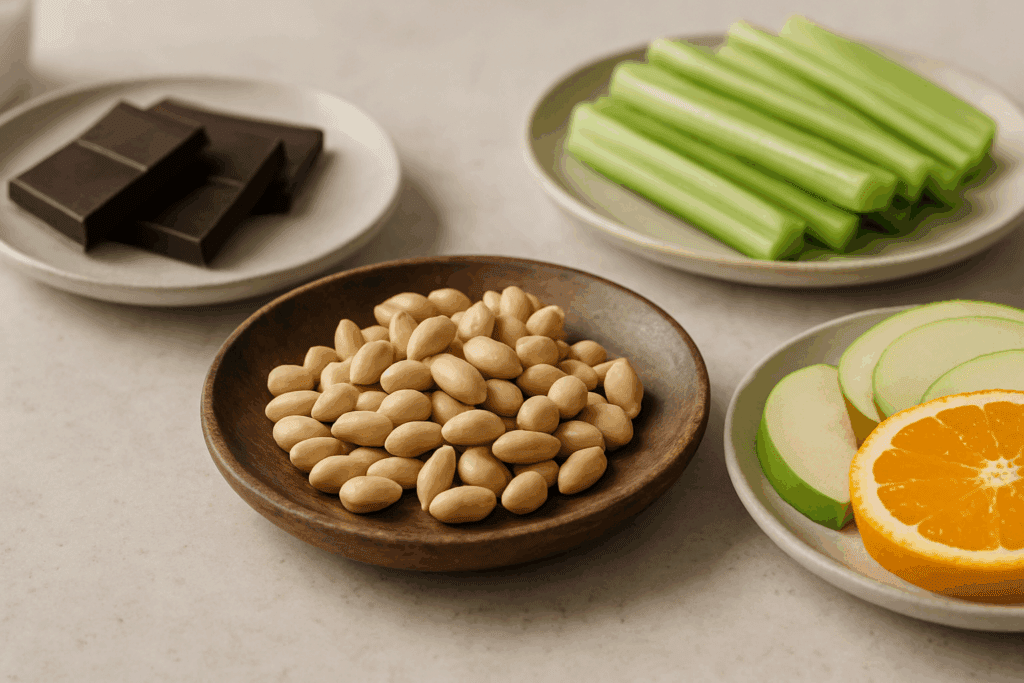
Conclusion: Choosing Nuts That Are Good for Cholesterol and Overall Heart Health
Incorporating nuts into a heart-conscious lifestyle is a strategic and scientifically validated way to manage high cholesterol. Through a combination of unsaturated fats, plant sterols, fiber, and antioxidants, nuts offer powerful tools for supporting cardiovascular health. The concern that nuts are high in cholesterol or that peanuts raise cholesterol is unfounded, as all plant-based foods, including these nuts, are naturally cholesterol-free.
Walnuts stand out for their omega-3 content and anti-inflammatory properties, making them especially beneficial for reducing LDL cholesterol and triglycerides. Cashews contribute valuable monounsaturated fats and help improve overall lipid profiles. Peanuts, often underestimated, have proven to be effective in lowering bad cholesterol and supporting a healthy heart through compounds like resveratrol.
For those wondering whether do cashews help lower your cholesterol or whether do walnut help control cholesterol, the answer is an evidence-based yes. Likewise, concerns such as does peanut increase cholesterol or are peanuts high in cholesterol can be laid to rest, given the favorable research findings. By choosing nuts that are good for cholesterol and integrating them into a balanced diet, individuals can take a proactive role in managing their heart health.
Ultimately, the best nuts for cholesterol are those that you enjoy and can incorporate into your daily meals without overindulgence. As part of a holistic approach to wellness, these nutrient-rich foods offer more than just flavor and satisfaction—they offer a path toward a longer, healthier life.
Further Reading:
5 foods that fight high cholesterol


